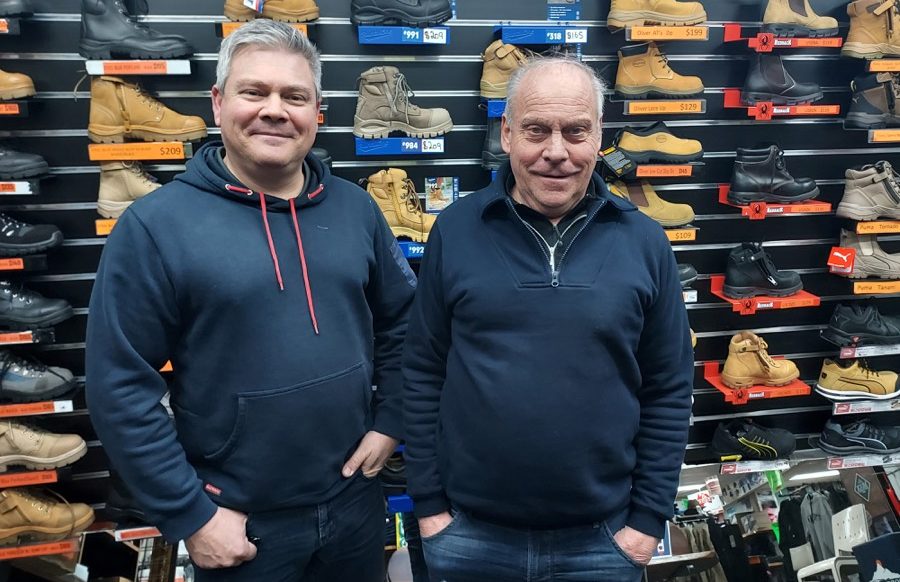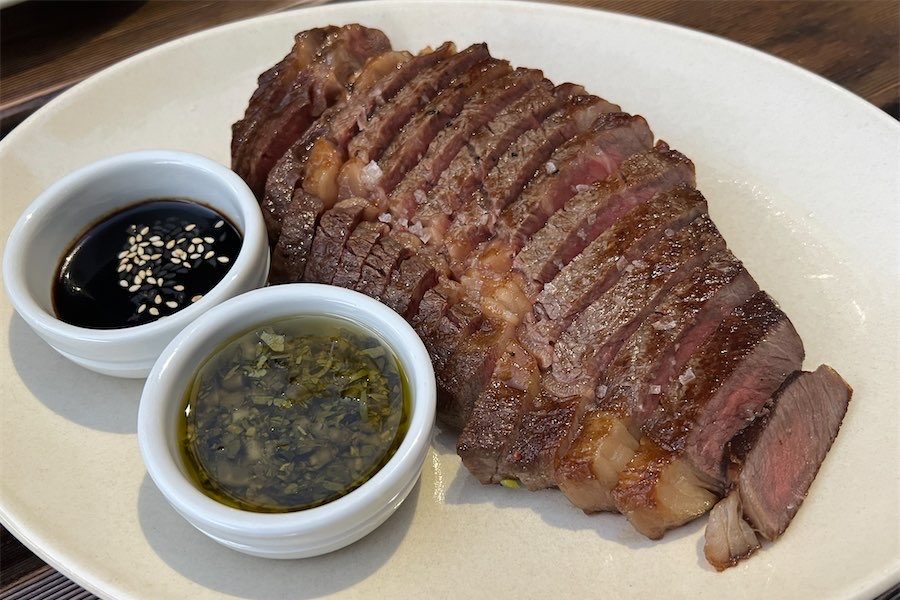In the lead-up to Tradies National Health Month, “CityNews” spoke to businesses who have the knowledge, skills and equipment that can help keep tradies safe.
SIXTY per cent of tradies often have aches and pains as a result of their job, according to the Australian Physiotherapy Association.
Their research has also found that two-thirds of tradies agreed that they would be more inclined to stretch or warm-up before starting work if their employer prioritised it.
These statistics are why the Australian Physiotherapy Association runs the Tradies National Health Month initiative every August.
The aim of the initiative is to raise awareness of the health and injury risks affecting those who work in trade occupations, as well as the flow-on effects to families, employers and the wider community.
In the lead-up to the month, “CityNews” speaks to businesses who have the knowledge, skills and equipment that can help keep
tradies safe.

WorkSafe ACT warns young workers are at risk
“A MANAGER or a boss yelling at you is just as dangerous as a drill that doesn’t have a guard,” says WorkSafe ACT Young Workers Strategy Coordinator Luke Folkard.
“Just like physical health, psychological health is an important part of work health and safety for young workers, including young tradies,” he says.
“They can be exposed to hazards like stress, bullying, fatigue, violence and aggression, sexual harassment, difficult situations or traumatic events and in the workplace psychosocial risks should be managed like any other risk.”
Luke says data analysis shows young workers are one of the most vulnerable groups in workplaces and may be more at risk of experiencing injuries, especially when they are new to the workplace.
“Young workers may be less likely to voice their concerns or not know where they should report issues,” says Luke.
“When your boss asks you to stick around after work or work on Saturday, a lot of young workers feel like they can’t say no.
“We’re looking to increase education both for employers and for workers around their rights and duties.”
Young Workers Inspector for WorkSafe ACT Nathan Merritt says that as an apprentice bricklayer, he had a positive experience with his employer, and that he’s striving to provide that to more people.
“I had good support from my boss, if I needed to report an incident I knew where to go and that’s a right I think everyone deserves,” he says.
“I knew my roles and responsibility, I knew what was wrong and right, and I had the confidence to stand up when I needed to and that’s something we want more young workers to be able to do.”
For more information and resources, call WorkSafe ACT on 132231 or visit worksafe.act.gov.au/initiatives/young-workers

‘Best in the business’ when it comes to safety gear
BACKED with more than 90 years’ combined industry experience, the Seears Workwear team is the “biggest and best in the business” when it comes to providing work safety gear and equipment, says owner Pat Seears.
“Everything is the best quality from the best manufacturers,” he says.
“We have high-vis clothing, hard hats, safety boots, gloves, safety glasses and goggles, respirators and much more.”
Having first started as a “two-bob shop in the early ‘80s”, Pat says Seears Workwear has grown to provide one of the largest ranges of workwear in Australia, including from brands such as Cat, Akubra, Rockport, Huski, FXD and Steel Blue to name a few.
The store also includes workwear for chefs, paramedics and firefighters, says Pat, who knows the needs of local businesses.
Located on Barrier Street, he also says they stock safety work boots, leather shoes and steel-toed canvas shoes, from brands such as Puma and Dunlop.
He says Seears can also assist companies through their corporate uniform services, which provide customised embroidery services for promotional clothing and business uniforms.
Seears Workwear, 60 Barrier Street, Fyshwick. Call 6280 4111 or visit seearsworkwear.com.au

Helping to prevent and manage pain
TRADESPEOPLE work in an incredibly demanding environment, says exercise physiologist at Higher Function, Sam Catherall.
“Carpenters, painters, electricians and other trades have a variety of different skill sets, but all of them require a well-rounded, physically and mentally strong body to complete their work,” he says.
“Lower back pain is the most frequently reported complaint, which can arise from an abundance of contributing factors including repetitive movements, poor stability and strength, stress and anxiety, poor rest and nutrition, and working overtime.
Sam believes psychological stress is also reported in the construction industry.
“With such a competitive market, there can be the added stress of finishing a job quickly while also marketing for the next one.
“This has the potentiality of encouraging poor work-to-rest ratios, resulting in an increased risk of injury.”
Sam says 88 per cent of tradespeople reported they take good care of their tools, yet only 61 per cent say they take good care of their bodies.
Tradies can see a physiotherapist or exercise physiologist for an initial assessment, and receive a tailored exercise program to use at their own gym, at home, or, Sam says, at Higher Function.
“Find what works for you and incorporate it into your specific lifestyle.”
Higher Function Physio & Pilates, Suite 4, Level 1/23 Petrie Plaza. Call 6262 9664 or visit higherfunction.com.au
Chronic pain treatment varies from person to person

WHEN treating chronic pain, Dr Nick Tsai from Orthopaedics ACT says it’s key to note that pain differs from person to person.
“It’s important to determine whether the pain is mechanical, which can be managed operatively by either fixing or replacing a joint, or related to other causes such as the spine or nerves, which often need medications, injections or other treatment methods,” he says.
Most commonly, Dr Tsai says Orthopaedics ACT sees patients with osteoarthritis pain, a condition he describes as “very debilitating”.
“It can negatively affect quality of life, sleep and makes it hard to function normally,” he says.
“In general this sort of pain responds very well [to treatment], even if it’s been going for a long time.”
But Orthopaedics ACT’s experienced team can help with other types of chronic pain, too, Dr Tsai says.
“Some people can have pain, which is not mechanical, but is related to nerve injuries and can become something called a complex regional pain syndrome,” says Dr Tsai.
“This is a different type of pain, which is generally not amenable to surgical treatment but needs a multi-disciplinary team approach to pain.
“Associate Prof Tillman Boesel, who is a visiting pain management specialist with Orthopaedics ACT, sees people with this variant of pain.”
Orthopaedics ACT, Woden Specialist Medical Centre, level 2, 90 Corinna Street, Phillip. Call 6221 9320 or visit orthoact.com.au
Tradies are athletes in a different uniform

“MORE than 30 per cent of Australians work as a tradie or in manufacturing but they represent almost 60 per cent of all workplace injuries,” says owner of Atlas Physiotherapy Roz Penfold.
“Tradies are really athletes in a different uniform,” says Roz, who brings more than three decades of experience to her role.
“They come in all shapes, sizes and ages! In fact often tradies also train in the gym, on the footy pitch or pull out their runners or bike shoes after work.
“Tradies rely on their musculoskeletal health when performing their work, and can tend to ignore body stress, pain and aches that, if left untreated, can lead to debilitation and disability in the future.”
Roz says the most common workplace injuries experienced by tradies are shoulder dislocations and tears, knee cartilage and ligament damage,
ankles sprains, acute lower back flares and muscular tears – particularly the quadriceps, calves and hamstrings.
“It’s well known that physiotherapists are highly experienced in treating sporting and workplace injuries, and this expertise is translated to assisting tradies prevent and recover from injuries,” she says.
“Atlas physiotherapists can assist in the initial management of these injuries, provide treatment where required, and most importantly guide them back to their workplace safely and in a timely manner.”
Depending on the specific trade, Roz also recommends a number of measures that can be taken to assist in minimising risk.
“Warm up and stretch where able, work around a neutral wrist position, vary tasks through the day, reduce time using tools that vibrate, rotate between using power tools and other tasks, change body positions regularly and use protective aids, gloves and guards where appropriate.”
Atlas Sports and Dance Physiotherapy, 30 Lonsdale Street, Braddon. Call 6248 5505
or visit atlasphysio.com.au
Who can be trusted?
In a world of spin and confusion, there’s never been a more important time to support independent journalism in Canberra.
If you trust our work online and want to enforce the power of independent voices, I invite you to make a small contribution.
Every dollar of support is invested back into our journalism to help keep citynews.com.au strong and free.
Thank you,
Ian Meikle, editor




Leave a Reply